|
|
|
Sort Order |
|
|
|
Items / Page
|
|
|
|
|
|
|
| Srl | Item |
| 1 |
ID:
119900
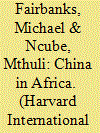

|
|
|
|
|
| Publication |
2012.
|
| Summary/Abstract |
Myths and realities about China's ambitions in Africa abound: China is monolithic, mired in stale ideology, subverting the Bretton Woods system, and unwilling to provide global public goods. Another is that China has no "soft power," that is, the ability to engage almost one billion Africans by persuasion, attraction, and market relations rather than brute economic and military force.
|
|
|
|
|
|
|
|
|
|
|
|
|
|
|
|
| 2 |
ID:
148255
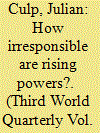

|
|
|
|
|
| Summary/Abstract |
Rising powers like Brazil, China and India have recently made significant gains in their capabilities as states. Therefore many IR scholars are claiming that these powers must now contribute more to the provision of global public goods like a clean environment, free trade and human rights. This article will argue that reasonably democratic international political discourses are another global public good whose greater supply is sorely needed and that rising powers are having a positive impact on the creation of such discourses. Thus rising powers are not behaving as irresponsibly as many IR scholars assume.
|
|
|
|
|
|
|
|
|
|
|
|
|
|
|
|
| 3 |
ID:
107927
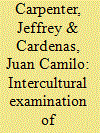

|
|
|
|
|
| Publication |
2011.
|
| Summary/Abstract |
We design a real-time, intercultural common pool resource experiment using participants from cultures that derive different benefits from a global public good (extraction vs. conservation of biodiversity resources) to analyze the effect of group affiliation on cooperative behavior. We also collect survey attitudes toward conservation to augment our experimental results. We find that when participants interact interculturally, extraction choices change significantly and that these changes can be attributed to an amplification of the relationship between attitudes and choices cued by the intercultural treatment.
|
|
|
|
|
|
|
|
|
|
|
|
|
|
|
|
| 4 |
ID:
090439
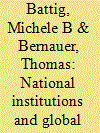

|
|
|
|
|
| Publication |
2009.
|
| Summary/Abstract |
This article examines whether democracies contribute more to the provision of global public goods. It thus contributes to the debate on the effects of domestic institutions on international cooperation. The focus is on human-induced climate change, in Stern's words "the biggest market failure the world has ever seen." Using new data on climate change cooperation we study a cross-section of 185 countries in 1990-2004. The results show that the effect of democracy on levels of political commitment to climate change mitigation (policy output) is positive. In contrast, the effect on policy outcomes, measured in terms of emission levels and trends, is ambiguous. These results demonstrate that up until now the democracy effect has not been able to override countervailing forces that emanate from the free-rider problem, discounting of future benefits of climate change mitigation, and other factors that cut against efforts to reduce emissions. Even though democracies have had a slow start in moving from political and legal commitments (policy output) to emission reductions (policy outcomes), particularly in the transportation sector, we observe some encouraging signs. The main implication of our findings for research on international politics is that greater efforts should be made to study policy output and outcome side by side. This will help in identifying whether more democratic countries experience larger "words-deeds" gaps also in other policy areas, and whether there are systematic differences of this kind between domestic and international commitments and across different policy areas.
|
|
|
|
|
|
|
|
|
|
|
|
|
|
|
|
| 5 |
ID:
172083
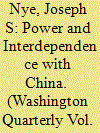

|
|
|
| 6 |
ID:
182520
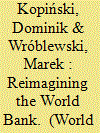

|
|
|
|
|
| Summary/Abstract |
For some time now, there has been a push for the World Bank to shift its focus toward global public goods (GPGs). These are goods that, once delivered, can be unrestrictedly consumed by most—if not all—countries on the planet. Nor are their benefits rivalrous. Moreover, the production of GPGs cannot be left to markets or individual countries, as these have suboptimal incentives to act. In the wake of the COVID-19 outbreak, the concept of GPGs has seen a revival of sorts, with the pandemic not only striking just as multilateralism was at its lowest ebb, but also serving as irrefutable proof that the world needs international collaboration now more than ever. Multilateral institutions, and in particular the World Bank—a leading global institution with global membership—can rightfully be regarded as a possible solution to many global challenges. Based on interviews conducted with World Bank senior staff, as well as numerous experts, this article discusses arguments in favor of such a strategic shift. While there are legitimate claims for the Bank becoming a full-fledged provider of GPGs, the institution’s historical roots and operational constraints make this an unlikely prospect.
|
|
|
|
|
|
|
|
|
|
|
|
|
|
|
|
| 7 |
ID:
077059
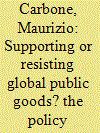

|
|
|
|
|
|
|
|